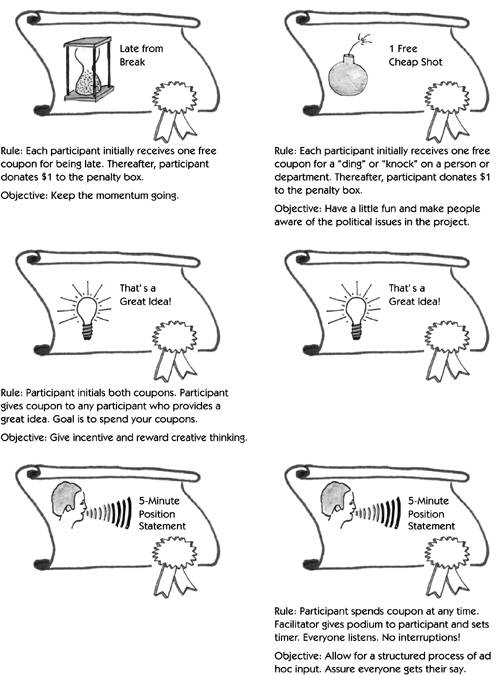Running the Workshop
Problems and Tricks of the TradeYou can see that the facilitator has a crucial role to play. To make matters even more exciting, these workshops are often characterized by a highly charged atmosphere. In other words, there are reasons why it is difficult to get consensus on these projects; nearly all these reasons will be present at the workshop. Indeed, the setting may even be politically charged, confrontational, or both. This is yet another reason for having a facilitator; let the facilitator take the heat and manage the meeting so as to not exacerbate any problems ”past, present, or future ”among stakeholders. Many facilitators carry a "bag of tricks" with them to help manage this highly charged atmosphere. At RELA, we evolved a set of highly useful "workshop tickets." Although they seem pretty odd, and even juvenile at first, you can trust us that they have proved their worth in a variety of settings. The more difficult the workshop, the more valuable they become! They also tend to spur "out-of-the-box" thinking. What's more, they are fun and they contribute to a positive tone for the session. Figure 11-2 provides a sample set of workshop tickets. Feel free to adapt them and use them, along with "instructions" for use. Figure 11-2. Workshop tickets Table 11-2 describes some of the problems that can occur in the workshop setting and also provides suggestions on how you can use the workshop tickets to address the problems. The facilitator must also introduce these rules at the beginning of the meeting and, ideally , reach a consensus that it's OK to use these silly tickets for this one day. Brainstorming and Idea ReductionThe most important part of the workshop is the brainstorming process. This technique is ideally suited for the workshop setting: it fosters a creative and positive atmosphere and gets input from all stakeholders. We'll cover brainstorming in the next chapter. Production and Follow-UpAfter the workshop, the facilitator distributes the minutes from the meeting and records any other outputs. Then the facilitator's job is over, and responsibility for success is again in the hands of the development team. Table 11-2. Problems and Solutions in the Requirements Workshop Setting
Thereafter, it's the project leader's job to follow up on any open action items that were recorded at the meeting and to organize the information for distribution to the attendees. Often, the output of the meeting will be a simple list of ideas or suggested product features that can be turned over immediately to the development team for further action. In some cases, additional workshops with other stakeholders will be scheduled, or additional elicitation efforts will be necessary to gain a better understanding of the ideas fostered at the workshop. |
EAN: N/A
Pages: 257
